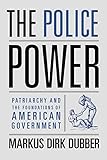The Police Power : Patriarchy and the Foundations of American Government / Markus Dirk Dubber.
Material type: TextPublisher: New York, NY : Columbia University Press, [2005]Copyright date: ©2005Description: 1 online resource (288 p.)Content type:
TextPublisher: New York, NY : Columbia University Press, [2005]Copyright date: ©2005Description: 1 online resource (288 p.)Content type: - 9780231132077
- 9780231506953
- 342.73/0418 22
- KF4695 .D82 2005eb
- online - DeGruyter
- Issued also in print.
| Item type | Current library | Call number | URL | Status | Notes | Barcode | |
|---|---|---|---|---|---|---|---|
 eBook
eBook
|
Biblioteca "Angelicum" Pont. Univ. S.Tommaso d'Aquino Nuvola online | online - DeGruyter (Browse shelf(Opens below)) | Online access | Not for loan (Accesso limitato) | Accesso per gli utenti autorizzati / Access for authorized users | (dgr)9780231506953 |
Frontmatter -- Contents -- Acknowledgments -- Introduction -- 1. Police as Patria Potestas -- 2. Blackstone's Police -- 3. Continental Police Science -- 4. Policing the New Republic -- 5. Definition by Exclusion -- 6. Police Power and Commerce Power -- 7. The Forgotten Power and the Problem of Legitimation -- 8. The Law of Police: Internal and External Constraints -- 9. Lochner's Law and Substantive Due Process -- Conclusion -- Notes -- Index
restricted access online access with authorization star
http://purl.org/coar/access_right/c_16ec
Mention the phrase Homeland Security and heated debates emerge about state uses and abuses of legal authority. This timely book is a comprehensive treatise on the constitutional and legal history behind the power of the modern state to police its citizens.Dubber explores the roots of the power to police-the most expansive and least limitable of governmental powers-by focusing on its most obvious and problematic manifestation: criminal law. He argues that the defining characteristics of this power, including the inability to accurately define it, reflect its origins in the discretionary and virtually limitless patriarchal power of the householder over his household. The paradox of patriarchal police power as the most troubling yet least scrutinized of governmental powers can begin to be resolved by subjecting this branch of government to the critical analysis it merits. Dubber shows us that the question must become how can the police power and criminal law together serve the goals of social equity that define and give direction to contemporary democratic societies? This book goes to the heart of this neglected but crucial topic.
Issued also in print.
Mode of access: Internet via World Wide Web.
In English.
Description based on online resource; title from PDF title page (publisher's Web site, viewed 02. Mrz 2022)


